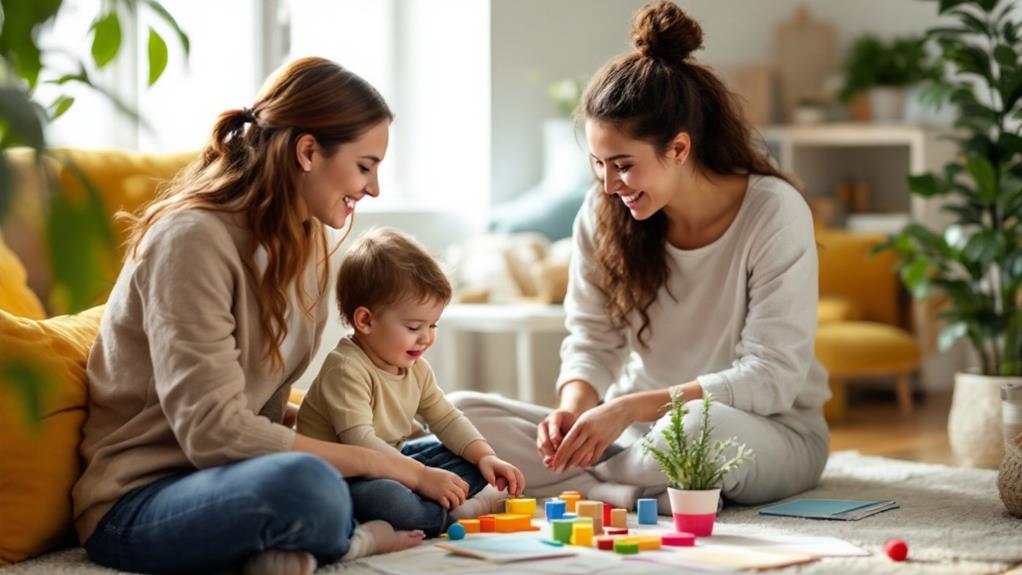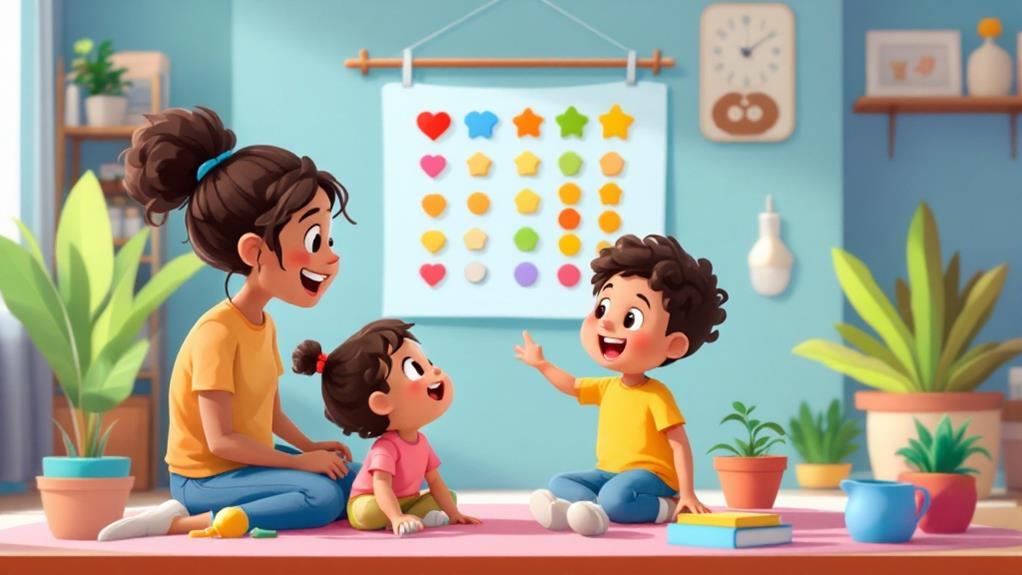Educating you as a parent on therapy techniques is essential for enhancing your child's progress. When you understand and apply these methods, you create a supportive environment that encourages growth. Your involvement helps reinforce skills learned in therapy, fostering consistency at home. You also cultivate open communication, making it easier for your child to express their feelings and celebrate achievements. This collaboration not only strengthens your bond but empowers your child to face challenges confidently. By embracing these strategies, you're laying a strong foundation for their long-term success. Discover more ways you can support your child's journey toward emotional resilience and development.
Key Takeaways
- Educated parents can reinforce therapy techniques at home, promoting consistency and deeper understanding of their child's needs.
- Knowledge of therapy methods enables parents to effectively communicate with therapists, ensuring collaborative and tailored support for their child.
- Informed parents can create a nurturing home environment that encourages emotional expression and skill practice, enhancing overall healing.
- Active involvement of parents in therapy fosters their child's emotional resilience, helping them to confidently navigate challenges and process feelings.
- Tracking progress together allows parents to celebrate milestones, boosting their child's motivation and reinforcing the value of therapy.
Importance of Parent Involvement

Parent involvement is essential in the therapeutic process, and studies show that kids whose parents actively participate in therapy sessions often experience better outcomes. When you engage in your child's therapy, you're not just a bystander; you're a vital part of their healing journey. Your presence provides emotional support and demonstrates that you care deeply about their progress.
By attending sessions, you gain valuable insights into the therapeutic techniques being used, making it easier for you to reinforce these strategies at home. This continuity between therapy and daily life helps your child feel more secure and understood.
You also get the chance to ask questions and voice any concerns, creating an open dialogue that fosters trust and collaboration. Moreover, your involvement can help you better understand your child's needs, strengths, and challenges.
When you're informed and engaged, you empower your child to feel comfortable expressing themselves and facing difficulties. Remember, your support is a powerful tool in their journey toward growth and healing. So, don't hesitate to step in and actively participate—you're making a meaningful difference in their lives.
Understanding Therapy Techniques
Many parents find it beneficial to grasp the various therapy techniques their child might encounter during sessions. Understanding these methods can empower you to support your child's progress in meaningful ways. For instance, if your child is engaging in cognitive-behavioral therapy, knowing how to reinforce positive thinking at home can make a significant difference.
When you know the specific techniques used in therapy, you're better equipped to practice them alongside your child. This creates consistency and helps your child feel more secure during their therapeutic journey.
You'll also be able to communicate more effectively with the therapist, sharing insights that can enhance the therapy process.
Additionally, grasping these techniques allows you to celebrate your child's achievements, no matter how small. Recognizing their progress can boost their confidence and motivation.
In essence, your understanding of therapy techniques not only enhances your child's growth but also fosters a deeper connection between you and your child. You become an active participant in their healing journey, and that involvement can be incredibly powerful.
Creating a Supportive Home Environment

Understanding therapy techniques lays a strong foundation for fostering a supportive home environment where your child can thrive. When you're equipped with knowledge about these techniques, you can create a space that encourages your child to practice what they learn in therapy.
It's important to reinforce those skills at home, making them a natural part of daily life. You can start by establishing routines that align with the therapy goals. Simple actions, like setting aside time for reflective conversations or engaging in activities that promote emotional expression, can make a significant difference.
Celebrate your child's achievements, no matter how small, and provide gentle reminders of the techniques they've learned. Additionally, maintaining open lines of communication is essential. Let your child know it's okay to share their feelings and challenges. This fosters trust and helps them feel secure in their environment.
Consistency Between Sessions
Establishing consistency between therapy sessions is essential for reinforcing the skills your child learns. When you implement the techniques discussed in therapy at home, you're creating a bridge between the sessions. This helps your child retain what they've practiced and fosters a sense of security and familiarity.
Remember, kids thrive on routine, and when they see you actively participating in their learning journey, it boosts their confidence.
You can make a significant impact by integrating these skills into everyday activities. For instance, if your child is working on social skills, encourage them to practice during playdates or family gatherings. Your involvement shows them that what they learn is important and valued. It's not just about the therapy room; it's about making these skills part of their daily lives.
Consistency also allows you to address any challenges that arise between sessions. By sharing your observations with the therapist, you can collaborate on adjustments to the approach, ensuring that your child's therapy remains effective.
Your commitment to maintaining this consistency not only supports your child's progress but also strengthens your relationship, making the journey of growth a shared and fulfilling experience.
Enhancing Communication Skills

Enhancing your child's communication skills can open up a world of opportunities for them. When you understand and apply therapy techniques at home, you create a supportive environment that encourages your child to practice and refine these skills. You become an essential partner in their progress, reinforcing what they learn in therapy.
Using simple strategies like active listening, asking open-ended questions, and providing positive feedback can greatly boost your child's confidence. When they see you engaged and interested in their thoughts, it fosters a sense of validation that's vital for their development. Encourage them to express their feelings and ideas; this not only improves their verbal skills but also strengthens your bond.
You can also model effective communication in everyday situations, demonstrating clarity and patience. This practice helps your child learn how to articulate their thoughts and emotions more effectively.
Building Emotional Resilience
Building emotional resilience is essential for your child's ability to navigate life's challenges with confidence. When you educate yourself on therapy techniques, you empower your child to face adversity with strength and adaptability. This resilience helps them manage stress, cope with setbacks, and maintain a positive outlook during tough times.
As you learn about emotional resilience, you can model healthy coping strategies at home. Encourage your child to express their feelings openly and validate their emotions. When you show them that it's okay to feel sad, frustrated, or anxious, you create a safe space for them to process these emotions.
Moreover, teaching problem-solving skills can boost their confidence in handling difficult situations. Engage your child in discussions about challenges they face and help them brainstorm potential solutions. This collaborative approach not only reinforces their resilience but also strengthens your bond.
Encouraging Positive Behavior Reinforcement

As you nurture your child's emotional resilience, you can also foster positive behavior by implementing reinforcement strategies that celebrate their efforts. Recognizing and rewarding your child's positive actions creates a supportive environment where they feel valued and understood. Simple gestures, like verbal praise or small rewards, can considerably boost their motivation and self-esteem.
When you consistently reinforce desirable behaviors, you help your child understand what actions are appreciated. This clarity encourages them to repeat those behaviors, making it easier for them to navigate challenges. For instance, if your child demonstrates patience during a difficult task, acknowledging that effort can motivate them to keep trying.
It's essential to be specific in your praise. Instead of a generic "good job," try saying, "I really admire how you waited your turn." This targeted feedback helps them internalize the behaviors you want to encourage.
Collaborating With Therapists
Collaborating with therapists can be a transformative experience for both you and your child. When you actively engage with the therapist, you create a supportive environment that fosters growth and understanding.
It's important to share your insights and observations about your child's behavior and emotions. This dialogue helps the therapist tailor their approach to fit your child's unique needs.
By working together, you can align on goals and strategies that reinforce the therapy techniques being used. Ask questions and express concerns; your input is invaluable.
When you understand the methods being employed, you're better equipped to implement them at home, reinforcing what your child learns during therapy sessions.
Additionally, regular communication with the therapist can help you stay on the same page regarding your child's progress. You can celebrate small victories together, which not only boosts your child's confidence but also strengthens the partnership between you and the therapist.
This collaborative approach guarantees that your child receives consistent support, ultimately enhancing their therapeutic journey. Remember, you're not just a spectator; you're a vital part of the team dedicated to your child's success.
Tracking Progress Together

Tracking your child's progress throughout therapy is an important aspect of the collaborative journey you share with their therapist. By actively participating in this process, you gain valuable insights into your child's development and well-being. It helps you understand what strategies work best and how to adapt them at home.
Regular communication with the therapist allows you to track milestones and adjust goals as needed. When you share observations from home, you contribute to a fuller picture of your child's experiences. This collaboration not only fosters trust but also empowers you to reinforce the skills your child is learning.
Encouraging your child by celebrating small victories can make a significant difference. Recognize their efforts, and let them know you're proud of the progress they're making. Keeping a journal or using a shared app can help you document changes, challenges, and triumphs, making it easier to discuss during therapy sessions.
Ultimately, by tracking progress together, you and the therapist can create a cohesive support system, enhancing your child's growth and fostering a sense of teamwork that benefits everyone involved. Your commitment to this journey is truly invaluable.
Long-term Benefits for Children
When your child engages in therapy, the long-term benefits can be transformative, shaping their emotional and social development for years to come. By educating yourself on therapy techniques, you empower your child to internalize the skills they learn. This not only helps them in the moment but also prepares them for future challenges.
You'll notice that as your child applies these techniques in everyday situations, their confidence grows. They'll learn to express their feelings more effectively, resolve conflicts with peers, and navigate social settings with greater ease. These skills aren't just fleeting; they lay the groundwork for healthier relationships and emotional resilience throughout their lives.
Moreover, your active involvement reinforces the idea that seeking help is a strength, not a weakness. This mindset can inspire your child to approach future challenges with a positive attitude.
The journey of therapy, complemented by your support, fosters a sense of security and belonging. Ultimately, as your child thrives emotionally and socially, you'll witness the remarkable long-term benefits that extend well beyond their therapy sessions, enhancing their quality of life in profound ways.
Conclusion
By educating yourself on therapy techniques, you become a guiding light for your child, illuminating their path to progress. Imagine creating a warm, nurturing atmosphere at home, where understanding blooms and communication flows like a gentle stream. As you consistently reinforce positive behaviors, you help build a sturdy bridge between therapy sessions. Together with your child and therapist, you'll track their journey, celebrating each milestone. This partnership not only nurtures immediate growth but sows seeds for a thriving future.
